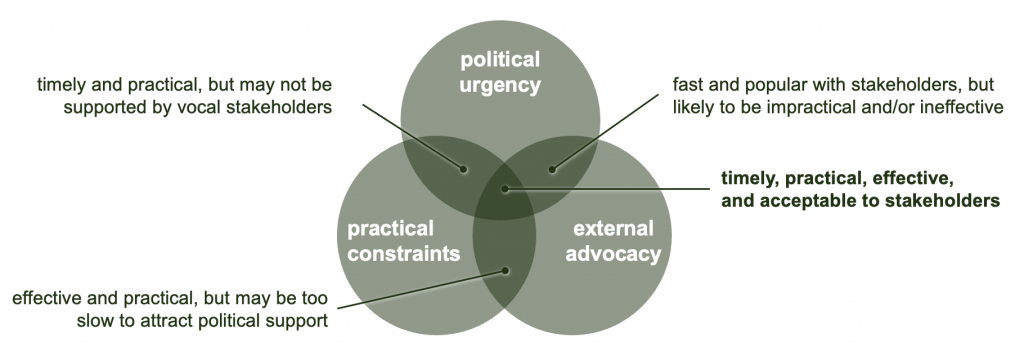Robust policy work takes time, often longer than politicians and the public would prefer. Stakeholders can be impatient for problems to be solved and reforms enacted without pause for detailed analysis, consultation, or planning. Advocates and partisan advisers are free to offer quick recommendations without considering practical delivery constraints. These policy hares can seem strong and fast, but speed alone does not win the policy race.
Publicly funded organisations deliver a complex web of public goods and services to communities. When pressing public policy or delivery issues emerge, the community expects bold ideas and swift action. Populist or partisan reactions emerge swiftly, often from people with substantial political authority.
Robust policy development needs to resist knee-jerk reactions and faddish proposals to optimise long-term public value. It is iterative and careful, thoughtful about emerging evidence, and conducts experiments at small scale before making big commitments. The professional approach to policy development takes time to consider different perspectives and interests, to recognise and manage potential risks, and to avoid or limit unintended negative consequences.
Some stakeholders dismiss traditional policy work as too slow to respond to emerging issues. Sometimes slow-moving policy workers can miss their moment. Political imperatives may sideline specialists in favour of other voices that offer faster answers, but short-term actions can be poor solutions for large-scale, wicked problems.
Robust policy development conducted behind closed doors does not satisfy demands for immediate, visible action. But rushed policy is often driven by ideology rather than analysis and so is more likely to be impractical, ineffective, and have unintended effects. Policy professionals can also be frustrated and confused by frequent changes of political direction before they have formulated robust advice.

A collaborative and inclusive policy design process that brings together multiple policy perspectives and priorities can be faster than engaging with stakeholders sequentially, without sacrificing rigour. Rapid policy development through a collaborative process is more likely to satisfy the need for speed, win broad acceptance, and be effective and practical.
Openly engaging political and community stakeholders builds public trust in policy-making and demonstrates progress to vocal advocates for action. Rapid-fire partisan advice or advocacy can be tested in real time against practical implementation considerations and available evidence. Compromises and trade-offs can be shared and understood, reducing the risk that unhappy stakeholders will agitate for political short-cuts in the policy development process.
Timely and practical policy, and long-term public value, need to test political, community, and advocate demands against evidence and real-world constraints.
A rapid, collaborative policy development process harnesses the energy of political urgency without compromising rigour and planning. Collaboration demonstrates good faith and moderates demands for immediate, but likely ineffective, knee-jerk responses. It also acknowledges competing perspectives and makes them visible to stakeholders who might not otherwise recognise the legitimate interests of others.
Engaging urgent external voices in rapid, but robust, policy development gets to good policy faster, delivering and sustaining better outcomes over time than haring off without taking time to think and plan.

social cohesion vs diversity